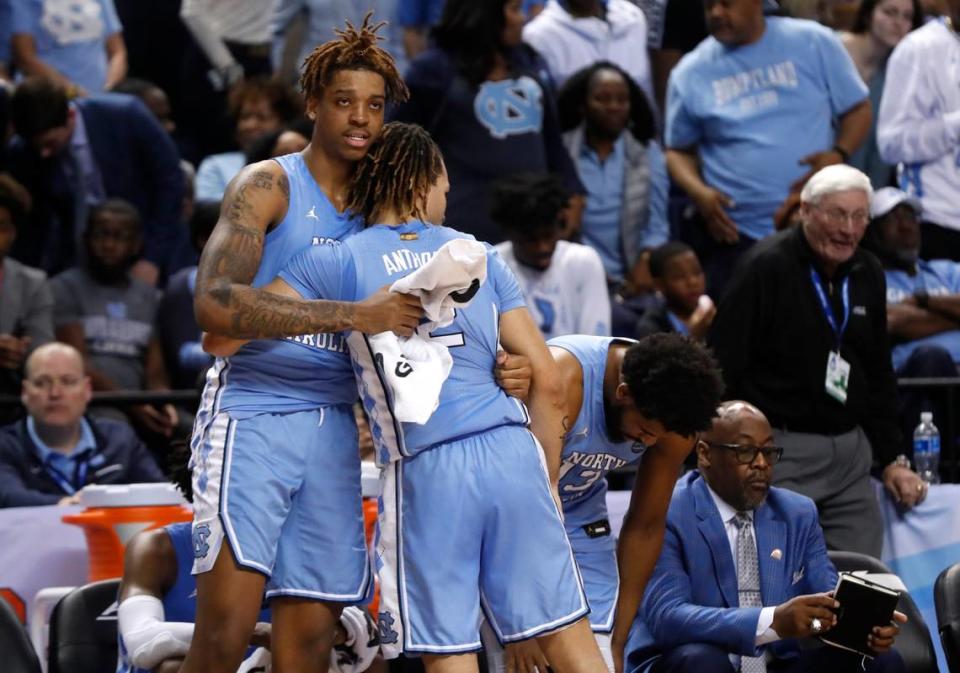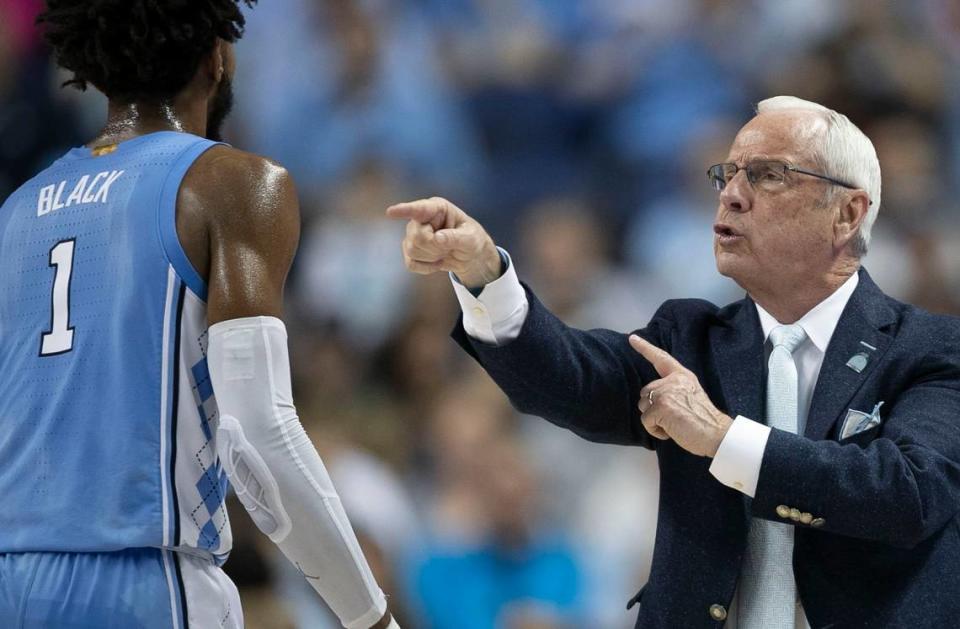ACC tournament’s strangest night comes full circle for many, exactly three years later
- Oops!Something went wrong.Please try again later.
- Oops!Something went wrong.Please try again later.
- Oops!Something went wrong.Please try again later.
It was a Wednesday night, this Wednesday night of the ACC tournament — the second round, teams fighting for their basketball lives — when everything began to change three years ago. It was the night an NBA game stopped mid-play. The night Tom Hanks revealed he and his wife tested positive for the virus. A night of dread, when nobody quite knew what was coming.
Here in the Greensboro Coliseum that night, North Carolina and Syracuse played in the late game, which turned out to be an uneventful and lopsided Orange victory. An unsettling quiet began to fall over the crowd, anxiety spreading with the news that COVID-19 had arrived in America.
People filed out of the arena that night knowing they wouldn’t be allowed back in for the rest of the tournament. The next day, the tournament itself ended. John Swofford, then the ACC Commissioner, held a bizarre and brief ceremony in which he awarded the championship trophy to Florida State, the top seed that year.
Everyone went home. And stayed home. Time moved slowly.
Three years have passed now and in some ways that feels impossible to believe, like we should be much further removed from March 2020, and in another way it all seems like yesterday. This week, in the early days of another ACC tournament in Greensboro, it has been impossible not to reminisce, and look back at one of the strangest times in our lives.
Walking into the Greensboro Coliseum on Tuesday brought back memories of walking out three years ago. Swofford had handed the trophy to a disbelieving Florida State team. Its band played for an audience of almost no one, for only family members were allowed in the building. The Seminoles’ mascot stood idly by, not quite sure what to do. That night, the roads were empty; the country was shutting down. Then came Wednesday, three years later, and more memories.

North Carolina was back in the late session. Not the final game, like 2020, but at night, nonetheless, and with two players, Armando Bacot and Leaky Black, who were on the court almost exactly three years earlier when everything started to become very strange. Black remembered it well, for how could he forget? How could anyone forget? Generations of people will remember the arrival of the pandemic by where they were that Wednesday night, and what they were doing.
Black was playing basketball with his UNC teammates, enduring a humbling season-ending defeat. Three years and a lifetime later, after the Tar Heels’ 85-61 victory against Boston College on this particular Wednesday, he could still feel what he felt on that Wednesday, the one when people began to fear that the virus could be lurking anywhere.
“We’re staying at the same hotel, and everything,” he said. “It’s kind of crazy, all the memories. Walking through the hotel hallways. And I remember coach (Roy) Williams bringing us all in and saying the season was over with, and that whole crazy thing — we didn’t know what was going to happen.”
That year, 2020, became a year defined by loss. There were all the losses in the college basketball world — the loss of the major conference tournaments; the loss of the NCAA tournament; the loss of March magic and memories for those who never got to experience what they might have otherwise. But then there were the real-life losses: lost businesses and jobs; lost time with family and loved ones; the incalculable loss of human life.
The ACC tournament returned here in 2021, but normalcy still remained elusive. It was a long ways away. The Coliseum grounds served as an early vaccination site. The relatively few fans allowed in the building sat in accordance with social distancing rules. Ushers held up signs reminding people to wear masks. The strangeness of the previous year had lifted, somewhat, but it all still felt weird and different, and a little like we weren’t ready for events like these.
This tournament, now, is the first one in a long time that feels like it did before 2020. It’s a marker of the distance traveled and the changes we’ve undertaken. Some are more obvious than others. The ACC of 2020 was a basketball conference of hall of fame coaches, with Mike Krzyzewski and Roy Williams and Jim Boeheim still leading their teams.

Williams retired in 2021, Krzyzewski last April and Boeheim on Wednesday, almost three years to the day that he won for the first time in Greensboro — and yet still didn’t advance due to the onset of a global pandemic. Meanwhile, most who were college freshmen in March 2020 are now seniors, like Bacot. Black was a sophomore back then and is now a fifth-year senior, one who came back for one more year when the NCAA granted athletes extra eligibility due to the pandemic.
Looking back, he said on Wednesday, “that year was so rough, man.”
But also: “I’m kind of glad it happened.”
And why?
“It really helped me grow up faster than I really wanted to,” he said.
There was more to it than that. In an instant, something was lost; taken away. The Tar Heels of 2020 weren’t going to play in the NCAA tournament, anyway, but the players on that team — like college students everywhere; like people everywhere, of all ages and in all situations — instantly lost something. The next college basketball season played out in mostly empty gyms, in front of no shortage of cardboard cutouts standing in as spectators.
Williams retired after that one. Krzyzewski soon announced he would be retiring after the next.
And now we’re here, after three years have gone by. Several teams now have new coaches. Only about a dozen or so players from that 2019-20 season remain in the ACC, including the two who helped lead UNC to victory on Wednesday night.
Bacot had transformed from a promising freshman to a record-setting forward with more double-doubles than anyone in school history, and one of the faces of this new name, image and likeness era in college sports. Black had transformed, from a shy sophomore, into a more confident leader and one comfortable talking about confronting his anxiety.
“Everything happens for a reason,” he said, and in a way he credited the start of his growth to the start of the world changing that Wednesday night in 2020 — or at least it was the night the country began to change.
Three years later, it felt a little like old times in the Coliseum. A partisan light blue crowd delighted in an easy UNC victory. Bacot and Black had traveled a long road for a full circle moment.
We could all relate in our own ways.

